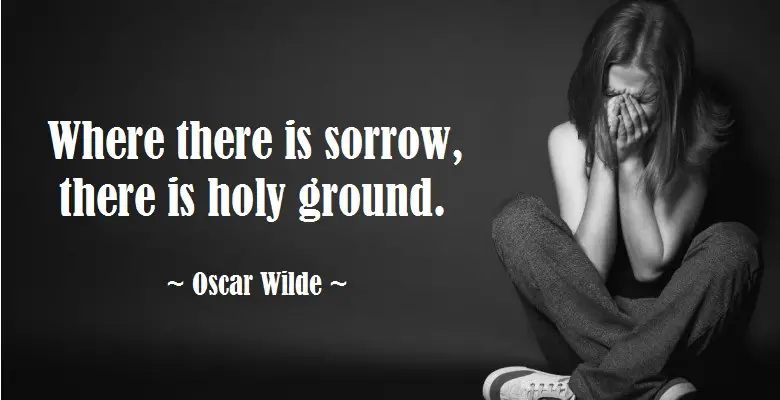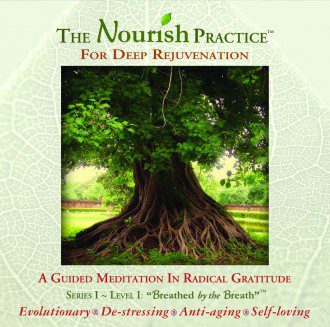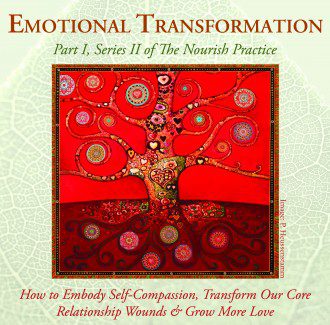Contributing writer for Wake Up World
“Where there is sorrow, there is holy ground.” ~ Oscar Wilde
Is it possible that grief is not just wretched sorrow? If so, to experience anything more than destruction in grief, what is asked of us?
Moving through loss is to not bypass the transformation it has in store for us. But to move through it, we first have to let it in. Once we allow it to settle in us — seeming to occupy every cell of our body — grief leaves us when it’s ready. So, in reality, we let grief occupy and move through us, leaving us changed to the degree we allow it to do its work.
At the center of grief is a strange sweetness, the tenderness of what we loved, that has left us now. So afraid we are of feeling wretched pain, we push our sadness away. This is a learned behavior, as we want to protect ourselves from what hurts. We can unlearn it and move counter-intuitively, and wisely, into our longing and heartache.
Moving away from what hurts our heart is also encouraged by a consumer-happy, discomfort-averse society, as well as through our involuntary motion away from pain. Doing so, we occupy numbness and superficiality and forfeit soulfulness and depth. Unmetabolized grief stunts our passion, sense of purpose, and our love.
Erroneously, we think that resisting emotional distress and pain will protect us, just as we might fend off an infection, an unruly person, or the common cold. Yet, with emotions, we must work paradoxically, and with an uncommon courage and inner resilience, in order to transform them. In actuality we don’t transform them; they change us in their own time according to how fully we can let them work on us.
Emotional pain, including grief, cannot transform us when we move away from it. Unless, of course, we recognize our movement away and this noticing helps us get closer to it, simply by noting our resistance and the split that occurs from denying it. With this said, neither can we force ourselves to get close to our pain. If we resist it, let us just notice this and be curious about our resistance. Let us notice what the results of the resistance are, and then, perhaps, organically, we might naturally, unexpectedly, find more compassion and interest to get closer. For, it takes a lot of energy, a lot of rigidity in body and mind to resist the torrents precipitated by loss.
Grief is the other side of feel-good love, the sinking Yin for the jubilant Yang. Just as there is a droplet of Yin within Yang, so the sweetness in our grief reveals the essence of the goodness in love. This hard-won ambrosia is squeezed from us by the contraction, the downward compressing of grief. And so grief grows our love by distilling the essence of our sorrow, which emerges on the lip of our hearts as strange beauty. In the end — and all along if we feel deeply and carefully notice — there is but only the thinnest veil, a semi-permeable membrane of sorts, between grief and love. The more we can grieve the deeper our love, and the more we love, the deeper our grief.
We cannot claim the essence, the nectar, of deep love by avoiding our sorrow. Most times, we must let it in completely, let it work on us, let it show us just how much we loved. While in love, we might have overlooked our fortune merely to have loved, and been loved. So grief returns love to us in new form, in the darkness of what was once light for us, and so helps to complete love, our humanness. Ironically, and in a paradox of love, grief’s darkness illuminates what we missed and couldn’t let in while we had what we wanted.
Let us consider, then, even gently muster, the courage to accept such strange beauty, that comes to fill us, and remind us, of our love and what we loved. For our grief celebrates what we loved and heals us of its absence. Maybe today we can accept a droplet more than what we thought we could yesterday. This way we allow the seed formed in the compression of our grief, the light of our love buried at the heart of sorrow, to form, to be watered with our holy tears, and to sprout joy when its time is right, when the season turns.
Just as spring can be felt before winter passes, so in the depths of grief and its changing of us, eventually the unbidden joy percolates from deep in our core, rewarding us with an inner vitality of sovereignty that will serve us through more challenging times to come. But we can’t enter grief looking for joy. It doesn’t work like this. It’s not linear, it’s transformational, meaning we go black and promise-less, forsaken, before daylight peeks into our heart again.
When we grasp for the light in our dark emotions, we block the light. Instead we wait for it to come to us, we receive it. This does not mean that we give up on taking care of ourselves and attempting to enjoy life. It does mean, however, that we don’t try to hide or escape grief and its tenure smothering it with positivity. Instead our positivity can merely give us respite, breathing room, to continue the journey of being transformed.
We can lend the light of our compassion, our deepest abiding and self-care to our ache, to the welcoming and hosting of grief. This is how our light grows more light from darkness, how the seeds and fruit of tree correspond directly to the integrity of its roots and the deep dark soil in which it grows. This poem distills the process:
REST OF LONGING
Trust those places with no way out,
The dark corridors of your longing.
In fact, entrust them more
Than you give to daylight
Which disappears with fall of night.
Only hidden light who waits for you
In shadows can reveal the invisible
Passage from darkness that leaves nothing
Behind.
When we deny the energy of what is now and today, we halt the turning of the seasons. The more we can embrace what is moment to moment, day to day, we fuel the natural cycle of life, death, and rebirth. This natural cycle, then, turns in us too, in our physiology and in our psyche, to the extent that we can accept all that is horrifying and beautiful inside and around us, that breaks and miraculously restructures us. For only in breakdown can we be rebuilt, cleansed, and restructured.
Without goodness there is no pain. And without pain, there is no goodness. Yin and Yang, always in tandem. Let us be careful, then, not to judge our sorrow, our losses, our shortcomings, our failures. We are not failures for them, not less than, but merely perfectly imperfect human beings doing the best we can with what we’ve been handed by evolution and our experience, especially our upbringing. All of us bear the wounds of the past and our gentle yet fierce task is the courage to bear witness to and embody all that pleases and pains us.
From the uncommon courage to endure and welcome our grief, is born an indescribable, unbidden light, an emanation from our core that ends up manifesting in our presence, our compassion, our care. This is our praise, this is our death resurrected not of our own will, but by our willingness to feel the heat, the compression, the awful chaos and torment of loss. This light can’t be planned or grasped, muscled or manufactured. It is created and re-birthed by paradox, by forgetting the light, feeling forsaken, cast out of grace. And yet, grace is never closer than our pain, whose by-product is the soft-glow of one who has been through hell and survived.
Your religion, your prized gurus, the wisdom of the ages, the poems and promises of this article, your plans for productivity, your affirmations, your ideas of enlightenment, and your strong body—none of this will carry you through the meaninglessness absurdity of embodying loss. Yet, they all can help too.
Let us have faith in the night, even as we kick and scream and wish it would end. Let us have faith in what fails us, even as we try to hang on, and on. Let us trust in the dissolution of what we love as it naturally slips away, as horrifying as it feels. Let us also save what we can, work hard to mend and compromise. Yet, let our larger embrace be to acknowledge the cycles of our experience, for even relationship has its cycles of prosperity and decline. Let us not push away the day, the hour, whether good or bad. And if we do, we can try to be gentler, to merely notice and frankly see the effects of doing so.
If our partner is leaving us, or has left, this is what is. If we lose a parent or pet or job, this is what is. As we age and lose our youth and vigor, this is unstoppable. We lose our health, our friends, our will to live sometimes. And through these losses our hearts become more potent. Over time, as we see how we get through losing connections and attachments we think we can’t live without, we gain a little more faith and trust with endings, with comings and goings. This can help us let go a little more easily, though its rarely easy getting through heartbreak.
When the season turns, as all seasons pleasant and unpleasant do, then let us trust we will make it through another autumn and its winter. We know there is spring and summer buried inside us, and to welcome them, we must welcome their predecessors. Without the death and compost of the dark seasons, there is no nourishment for the lighter. A mighty tree cannot grow in soil that has denied the decay and death of autumn and winter, when the leaves and branches fall and all dies to be turned into black loam to nourish what we appreciate in the above-ground appeal of a tree.
Can we look more closely and appreciate the fuller reality? Can we see that the branches, leaves, and fruits—what we love—require what is dark, hidden, messy, and smelly? Can we remember what is not seen, the roots and nutrients in the soil, that feed what we love? Grief is what works in the dark, on our roots, in the unseen, making us more than what we appear—no, making possible what is great and beautiful in us.
In Chinese medicine, autumn corresponds with grief and sorrow, with letting go and decay. In autumn we begin our journey into the unknown, into the bleakness that has no vision, and maybe only a sliver of faith. In winter we dissolve further into that bleakness, and our hope and faith may desert us altogether. Only in this deserting can another kind of faith arise, one that has no reason or mustered hope, but seems imperceptibly supported by the fumes of our spirit. The compression of grief is like the concentrated magic of an acorn for the mighty oak. Like the acorn, our invisible vision and blueprint for something grander are hidden in what we could never imagine in our smallness, in our pain.
Grief itself breaks the shell of our apparent diminishment, after it compresses us. Then, there is nowhere to go but up, and we are carried up unbidden, almost as effortlessly as we were plummeted to our depths. This transmutation results from the humble strength of our vulnerability and the endurance of our resurrection from brokenness.
Perhaps our most courageous prayer during loss is to take heart, great heart. To what extent can we welcome, moment to moment, what is in the moment, and not fight it? Doing so makes us more, though in the moment it feels like less. If we don’t know from previous loss that we will survive and even thrive after the caverns of loss, then let these words be some hope. The ability to endure is our yes, a triumph in itself, a celebration of life, no matter how dark it can seem.
Yet, in our grief we must forget all this wisdom, for it can take us away from giving ourselves to the crucible of the moment, and then the next. It can only be a reminder we hold on the outskirts of our immediate experience, or else we separate from what coursing through us now. In grief, we allow ourselves to cry, to feel helpless, and we ask others to accept us as we are, to hold us and to offer us comfort. May this writing help you endure, not so much wish and hope. For, clinging to hope when we feel it lacking can be to prevent a truer hope from finding us in the places we least expect. I offer you blessings and great courage in your journey… and another poem from Nature of the Heart in farewell for now:
ALCHEMY
Like vinegar of
Expectant grapes
The heart draws inward
To the quiet chambers
Of restoration
Waiting in darkness
For resurrection
By the thirst of its own juices
Spilled by life’s sacred accident
Aching with a now growing
Hopefulness that comes
With enduring grief’s deliverance
From bitter days, waiting to ripen
Elegantly sour, painfully sweet,
Wisely aged, strangely blessed
Ready again to taste the world
Anew.
The Nourish Practice
Jack Adam Weber’s “The Nourish Practice” is an easy, guided meditation-Qi Gong practice in radical gratitude and self-love. It is an Earth-based, body-centered practice — at once physiological and mythological — that is deeply relaxing and replenishing, especially for modern-day burn-out syndrome, and requires little physical effort. “The Nourish Practice” resets your nervous system and fosters a rich inner life.
You can purchase The Nourish Practice as a CD or Digital Download here.
PLUS: The first installment in Jack Adam Weber’s new “Emotional Transformation” series, entitled “Healing from Heartbreak”, is available now!
Previous articles by Jack Adam Weber:
- The Modern Shaman: Fierce Love at the Frontier of Madness
- When We Love an Addict – Courage and the Limits of Compassion
- Arrogance in Relationships: How to Deal With and Heal It
- 11 Reasons Why Hippies (Not Psychos) Should Rule the World
- The Monsanto Years: Singer Neil Young Rips Into GMOs, Big Biz and Conformity
- ReVOLUTION: When Enough is Enough
- Sex – Truth and Dare, Pleasure and Purpose
- Relationships: The Costs of Staying When We Should Leave
- Yin Yang — Ancient Wisdom for Personal and Planetary Transformation
- Heartbreak – Loving Ourselves Through Difficult Times
- Sacred Space – What Is It and Why Do We Need It?
About the author:
 Jack Adam Weber, L.Ac. is a Chinese medicine physician, author, celebrated poet, organic farmer, and activist for body-centered spirituality. He is also the creator of The Nourish Practice, an Earth-based rejuvenation meditation. Weber is available by phone for medical consultations and life-coaching.
Jack Adam Weber, L.Ac. is a Chinese medicine physician, author, celebrated poet, organic farmer, and activist for body-centered spirituality. He is also the creator of The Nourish Practice, an Earth-based rejuvenation meditation. Weber is available by phone for medical consultations and life-coaching.
You can connect with Jack at:
- Website: JackAdamWeber.com
- Facebook: Facebook.com/JackAdamWeber
- Twitter: Twitter.com/JackAdamWeber
- Email: [email protected]

If you've ever found value in our articles, we'd greatly appreciate your support by purchasing Mindful Meditation Techniques for Kids - A Practical Guide for Adults to Empower Kids with the Gift of Inner Peace and Resilience for Life.
In the spirit of mindfulness, we encourage you to choose the paperback version. Delve into its pages away from screen glare and notifications, allowing yourself to fully immerse in the transformative practices within. The physical book enriches the learning process and serves as a tangible commitment to mindfulness, easily shared among family and friends.
Over the past few years, Wake Up World has faced significant online censorship, impacting our financial ability to stay online. Instead of soliciting donations, we're exploring win-win solutions with our readers to remain financially viable. Moving into book publishing, we hope to secure ongoing funds to continue our mission. With over 8,500 articles published in the past 13 years, we are committed to keeping our content free and accessible to everyone, without resorting to a paywall.










